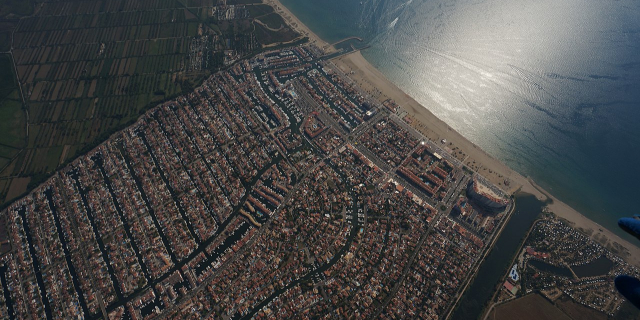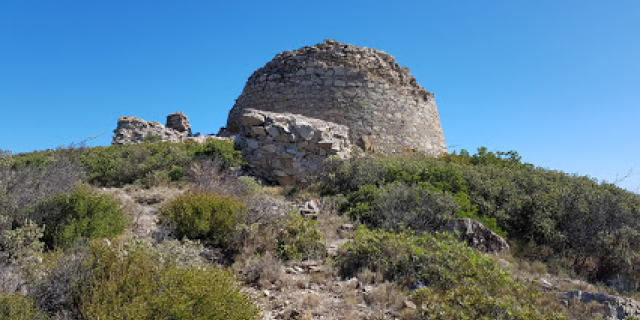Empúries (Catalan: Empúries [əmˈpuɾiəs]) was an ancient city on the Mediterranean coast of Catalonia, Spain. The city Ἐμπόριον (Greek: Ἐμπόριον, Emporion, meaning "trading place", cf. emporion) was founded in 575 BC by Greek colonists from Phocaea. After the invasion of Gaul from Iberia by Hannibal the Carthaginian general in 218 BC, the city was occupied by the Romans (Latin: Emporiae). In the Early Middle Ages, the city's exposed coastal position left it open to marauders and it was abandoned.
Empúries is located within the Catalan comarca of Alt Empordà on the Costa Brava. The ruins are midway between the town of L'Escala and the tiny village of Sant Martí d'Empúries.
 Emporiae coins, 5th-1st century BC.
Emporiae coins, 5th-1st century BC. Map of the Ruïnes d’Empúries.
Map of the Ruïnes d’Empúries. Greek kalyx krater found at Empúries
Greek kalyx krater found at EmpúriesEmpúries was founded on a small island at the mouth of the river Fluvià, in a region inhabited by the Indigetes (at the present time, the mouth of the Fluvià is about 6 km to the north). This city came to be known as the Palaiapolis, the "old city" when, towards 550 BC, the inhabitants moved to the mainland, creating the Neapolis, the "new city".
After the conquest of Phocaea by the Persian king Cyrus II in 530 BC, the new city's population increased considerably through the influx of refugees. In the face of strong pressure from Carthage, the city managed to retain its independent Hellenic character. Political and commercial agreements were concluded with the indigenous population long settled in the nearby city of Indika. Situated as it was on the coastal commercial route between Massalia (Marseille) and Tartessos in the far south of Hispania, the city developed into a large economic and commercial centre as well as being the largest Greek colony in the Iberian Peninsula.
During the Punic Wars, Empúries allied itself with Rome, and Publius Cornelius Scipio initiated the conquest of Hispania from this city in 218 BC by sending his brother Gnaeus Cornelius Scipio Calvus there with Roman troops.
After the conquest of Hispania by the Romans, Empúries remained an independent city-state. However, in the civil war between Pompey and Julius Caesar, it opted for Pompey, and after his defeat it was stripped of its autonomy. A colonia of Roman veterans, named Emporiae, was established near Indika to control the region.
From that time onwards, Empúries began to decline, obscured by the power of Tarraco (Tarragona) and Barcino (Barcelona). At the end of the 3rd century it became one of the first cities in Spain to admit Christian evangelists. In that century, too, the Greek town was abandoned while the Roman town survived as a mint and the largely ceremonial seat of a coastal county, Castelló d'Empúries,[1] until the Viking raids of the mid-9th century. Coinage began again under count Hugh II of Empúries (1078–1117).



































Add new comment